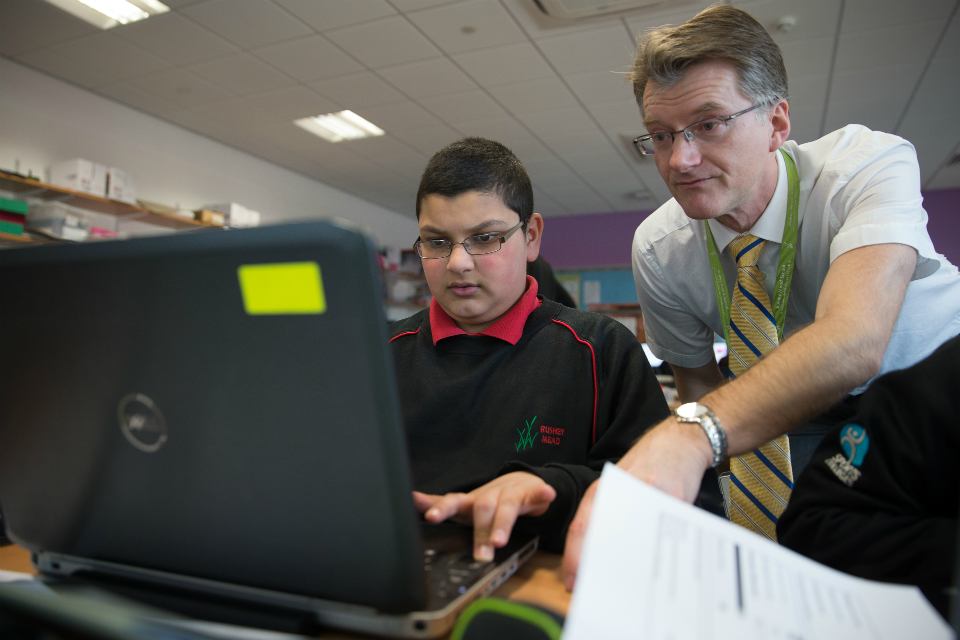Your Life maths and science campaign launched
Education Minister Elizabeth Truss speaks about the Your Life campaign, which encourages more young people into maths and science.

Earlier this year I visited Shanghai to see why they were number 1 in maths education - why there is virtually no difference in performance between girls and boys or those from low and high income backgrounds.
I saw great teaching, motivated students and lots of hard work.
But more than that I saw a deep belief in maths and science - students told me of their ambitions to be engineers, work in tech or teach the subject.
One professor told me there was a Chinese saying “maths gets you everywhere”.
They were right. Every sector in our economy has been transformed by technology. There is no such thing as a job where maths is not useful.
Big data and statistics are now as vital in marketing as they are in medicine. The earnings premium on studying engineering, physics or maths is increasing by the day.
That’s why business is speaking out so strongly today as the Chancellor mentioned.
For our children to go on and succeed in the modern world - they need maths and science.
Progress, but still work to do
The message is getting through. A majority of the public now think maths and science are important for young people’s careers - it was only 27% in 2008.
Record numbers of pupils entering the sciences at GCSE and A level - and almost as many girls as boys take GCSE physics - almost 75,000.
But despite these advances - the pipeline of talent is broken at age 16.
A levels are the most popular choice at 16. But only 2% of girls taking A level do physics and only 8% do maths - the numbers aren’t much better for boys.
We ran focus groups of teenagers in Leeds, York and London a month ago. These bright and ambitious young people wanted success, to know that a career would be interesting, enjoyable and well rewarded.
Their views on maths and physics were as follows:
- male
- equations
- glasses
- boring
- formula
- irrelevant
They didn’t know that maths is the only A level proven to increase earnings in later life - by an average of 10%.
They were surprised to hear that maths and physics aren’t just about a narrow range of careers - that they open doors.
Just look at the board for Your Life and what they’ve achieved through maths and science.
Edwina, in customer service. Sarah turning marketing on its head. Entrepreneurs like Belinda, Ruth, Sherry or Eben, who jets between Sheffield and Silicon Valley. Engineers like Roma, who helped build the Shard. Ben, sending missions to mars. Melanie, working on nuclear fusion, or coders like Nick.
They have got everywhere and that’s the message they are taking to the next generation.
They are focused on that broken pipeline at 16 - on giving young people, especially girls the confidence to believe that studying maths and physics can be for them and will open up a world of opportunities.
Which is why we’re acting
One of the most important factors in students taking these subjects is teachers encouraging them.
We’ve got 2 pupils here today in the audience. Neither liked maths. They wanted to drop it.
But they then went to Sir Isaac Newton Free School in Norwich. Its inspirational leadership were firm about the importance of maths - and told them to stick with it.
And now Christian, who wants to be a ship captain, knows he needs maths to get there.
And Ellen, who wants to be a child psychologist, has really got into the subject, looking forward to each and every lesson.
That’s what inspirational teachers can do. And we want more.
So today, we’re creating new maths and physics chairs.
These are postgraduate specialists in maths and physics, hired to inject their enthusiasm and subject expertise into schools - to raise standards and get children excited about maths and physics.
We know that in half of all mixed state schools no girls take physics A level.
We want to eradicate these science deserts.
The new chairs will provide masterclasses, online lesson demonstrations. They will help link the classroom to business and universities and complement other great programmes like stimulating physics and maths hubs.
And some great household names have sponsored the scheme, including GlaxoSmithKline, BAE Systems and Samsung.
These chairs will be paid £40,000 - an attractive offer.
Recruitment is already underway, and the first chairs will be in classrooms from this autumn. In due course we want to see hundreds recruited.
So thanks to Researchers in School, who are managing the scheme - to our sponsors - and of course the first chairs - who have the most important job of all.
Conclusion - just think what’s possible
And if we get this right - then the opportunity is huge.
Think of where we could be with dramatically more young people taking maths and science at 16. Think of the impact on productivity and competitiveness.
We’ll set our children up for a future as makers, inventors, coders, yes - but also marketers, journalists, managers too, everything from sea captains to psychologists, broadening their horizons - and giving them the very best start in life.
We want to be a can-do maths and science country.
This is our route to future success. Maths and science can get us everywhere.